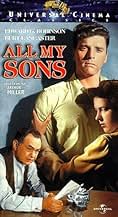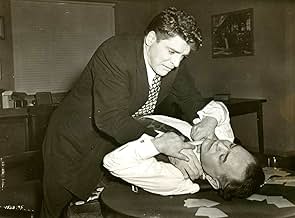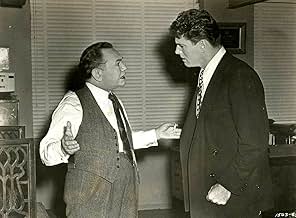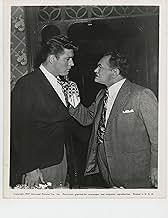IMDb RATING
7.3/10
2.6K
YOUR RATING
During WW2, industrialist Joe Keller commits a crime and frames his business partner Herbert Deever but years later his sin comes back to haunt him when Joe's son plans to marry Deever's dau... Read allDuring WW2, industrialist Joe Keller commits a crime and frames his business partner Herbert Deever but years later his sin comes back to haunt him when Joe's son plans to marry Deever's daughter.During WW2, industrialist Joe Keller commits a crime and frames his business partner Herbert Deever but years later his sin comes back to haunt him when Joe's son plans to marry Deever's daughter.
- Director
- Writers
- Stars
- Awards
- 2 wins & 2 nominations total
Harry Morgan
- Frank Lubey
- (as Henry Morgan)
Margaret Bert
- Townswoman
- (uncredited)
Walter Bonn
- Jorgenson
- (uncredited)
Helen Brown
- Mrs. Hamilton
- (uncredited)
Pat Flaherty
- Bartender
- (uncredited)
Jack Gargan
- Workman
- (uncredited)
Harry Harvey
- Judge
- (uncredited)
Jerry Hausner
- Halliday
- (uncredited)
Herbert Heywood
- McGraw
- (uncredited)
- Director
- Writers
- All cast & crew
- Production, box office & more at IMDbPro
Featured reviews
Although Edward G. Robinson was most famous for playing gangsters, he was a very versatile actor, playing comedies, dramas, and even period pieces. He even took on the very heavy lead in the Arthur Miller play All My Sons. Upsetting, intimate, and one you'll probably watch only once, All My Sons is worth it for the acting. Eddie G is fantastic! His long-suffering wife Mady Christians (really only remembered today as Shirley Temple's aunt in Heidi) won a Rag award for her performance. Though filmed in 1948, everyone is very realistic and subtle in their deliveries. This may be a play adaptation, but it's as much of an eavesdropped slice of life as it can possibly be.
Even starting with the opening credits, it feels like you're observing a family, not watching a movie. From the dawn of Tinseltown, credits preceded the film with music (or silence) and black and white titles. All My Sons was either the first or one of the first films to show footage behind the text instead. Immediately, you're immersed. When Burt Lancaster shares scenes with his girlfriend, Louisa Horton, you hear them whispering while in dim lighting. This is an entirely different type of drama. There aren't spotlights, strategically turned heads during important lines, and shouting to the back row.
If you like upsetting dramas, this might become a favorite of yours - especially if you're an Arthur Miller fan. Director Irving Reis got the best performances from his actors and brought what could have been a melodrama into a family's living room. It's a very good film, but it might be too heavy for the average viewer.
Even starting with the opening credits, it feels like you're observing a family, not watching a movie. From the dawn of Tinseltown, credits preceded the film with music (or silence) and black and white titles. All My Sons was either the first or one of the first films to show footage behind the text instead. Immediately, you're immersed. When Burt Lancaster shares scenes with his girlfriend, Louisa Horton, you hear them whispering while in dim lighting. This is an entirely different type of drama. There aren't spotlights, strategically turned heads during important lines, and shouting to the back row.
If you like upsetting dramas, this might become a favorite of yours - especially if you're an Arthur Miller fan. Director Irving Reis got the best performances from his actors and brought what could have been a melodrama into a family's living room. It's a very good film, but it might be too heavy for the average viewer.
Playwright Arthur Miller had a great deal at stake when his play 'All my Sons' opened on Broadway in 1947. He later admitted that had the play failed he would have been obliged to find another line of work. Directed by Elia Kazan and featuring a top notch cast it ran for almost two years. The rest, as they say, is history.
It did not take long of course for Hollywood to pounce and to make a version that Miller himself came to despise. This play is not the last in which Miller would show the darker side of the American Dream. Adaptor Chester Erskine has however, carefully removed any of Miller's leftist sentiments and the crime committed by Joe Keller in selling defective cylinders to the US Airforce, which results in the death of 21 pilots, is blamed on Keller's own greed rather than the Capitalist system that created him and so many like him.
To my knowledge there is nothing in the previous films of Irving Reis that would suggest his being capable of doing justice to this material and his direction lacks fluidity. He is aided by the 'noirish' touches of cinematographer Russell Metty and an understated score by Leith Stevens. In keeping with the inevitable compromise of film, some characters, notably Dr. and Mrs. Bayliss, have been diminished. Keller's business partner Deever who has taken the rap for the crime and is only spoken of in the play, is here given a speaking role which is filmically very effective. Deever's daughter Ann is played by Louisa Horton who is not a typical Hollywood glamour puss by any means but whose directness and sincerity make her excellent casting. This was to be her first and only film role of note. Burt Lancaster plays Keller's son Chris. Although keen to improve as an actor, Lancaster's charisma works against him here and he does not really convince as an average Joe. As Deever's son, Howard Gruff is as Duff as ever and strictly one dimensional. The strength of the film lies in the performances of Edward G. Robinson and Mady Christians as Joe and Kate. Robinson is superlative as a man whose outward bonhomie and confidence conceal a terrible sense of guilt. His assertions that he did it 'for the family' have a hollow ring. Kate is living in a fantasy world, clinging to the belief that their son Larry, reported lost in action, will return. The devastating scene in which she reads the letter confirming his death is beautifully played.
Ironically Miller, Robinson and Christians were all summoned by the HUAC for alleged Communist leanings. Miller emerged unscathed, Robinson's 'A' listing suffered throughout the 1950's until Cecil B. de Mille came to his rescue but Christians was not so fortunate. Her outspokenness not only shattered her career but ended her life.
This piece is decidedly not filmed theatre. It is cinema but alas, not great cinema.
It did not take long of course for Hollywood to pounce and to make a version that Miller himself came to despise. This play is not the last in which Miller would show the darker side of the American Dream. Adaptor Chester Erskine has however, carefully removed any of Miller's leftist sentiments and the crime committed by Joe Keller in selling defective cylinders to the US Airforce, which results in the death of 21 pilots, is blamed on Keller's own greed rather than the Capitalist system that created him and so many like him.
To my knowledge there is nothing in the previous films of Irving Reis that would suggest his being capable of doing justice to this material and his direction lacks fluidity. He is aided by the 'noirish' touches of cinematographer Russell Metty and an understated score by Leith Stevens. In keeping with the inevitable compromise of film, some characters, notably Dr. and Mrs. Bayliss, have been diminished. Keller's business partner Deever who has taken the rap for the crime and is only spoken of in the play, is here given a speaking role which is filmically very effective. Deever's daughter Ann is played by Louisa Horton who is not a typical Hollywood glamour puss by any means but whose directness and sincerity make her excellent casting. This was to be her first and only film role of note. Burt Lancaster plays Keller's son Chris. Although keen to improve as an actor, Lancaster's charisma works against him here and he does not really convince as an average Joe. As Deever's son, Howard Gruff is as Duff as ever and strictly one dimensional. The strength of the film lies in the performances of Edward G. Robinson and Mady Christians as Joe and Kate. Robinson is superlative as a man whose outward bonhomie and confidence conceal a terrible sense of guilt. His assertions that he did it 'for the family' have a hollow ring. Kate is living in a fantasy world, clinging to the belief that their son Larry, reported lost in action, will return. The devastating scene in which she reads the letter confirming his death is beautifully played.
Ironically Miller, Robinson and Christians were all summoned by the HUAC for alleged Communist leanings. Miller emerged unscathed, Robinson's 'A' listing suffered throughout the 1950's until Cecil B. de Mille came to his rescue but Christians was not so fortunate. Her outspokenness not only shattered her career but ended her life.
This piece is decidedly not filmed theatre. It is cinema but alas, not great cinema.
I saw this movie today for the umpteenth time and it finally occurred to me... Weren't both men to blame? Wasn't Herbert Deever really just as guilty as Joe Keller? No matter who "says" they are responsible, anyone involved in knowingly shipping faulty parts that could kill people is responsible. Deever shouldn't have sent them out, no matter what he was told. Isn't that what all those Nazis claimed when asked how they could commit so many atrocities? "I was just taking orders." That doesn't wash with me or with most people. We all have a responsibility to follow our own consciences with regard to right and wrong.
They were both guilty....
It's a wonderful story and very well performed and written, but that fact remains to be discussed.
They were both guilty....
It's a wonderful story and very well performed and written, but that fact remains to be discussed.
The movie version of Arthur Miller's All My Sons is yet another excellent example of how a fairly dreadful play can make a watchable, even beautiful film. In its day quite relevant, the play now reeks of the stuffily leftish Old Testament pieties of the Group Theatre of the thirties, and in style, if not content, anticipates the think-piece, more mainstream television dramas of the fifties. The plot is worth going into only briefly, and concerns a morally corrupt though not innately bad manufacturer of aircraft parts whose cost-cutting was responsible for the crashing of several planes during the then recent Second World War. Set in what appears to be either a New York suburb or a leafy section of one of the city's outer boroughs, the films is beautifully photographed and designed. It isn't quite realistic, as it is obviously a studio product, but it is far less artificial-looking than most movies of the period, and is singularly evocative in every detail of a way of middle class life, leisurely and informal, egalitarian and yet conscious of social distinctions, that has long passed into history. Beautifully rendered also is the large, very comfortable house in and around which much of the film takes place. Not quite a mansion, it is nevertheless roomy and in its way elegant, of Victorian vintage or nearly so. We get to see so much of it. The dining room, with its fluffy, lacey things all about; the heavy soup bowls and plates decorated with vines and flowers; and in its somwhat retro feeling it appears, like the family itself, both vaguely European and wholesomely American. Everything in the house seems heavy and solid, nailed down, as it were, as if this way of life was going to go on forever. The scenes in the backyard show the lazy, hazy summer afternoons of lemonade and hammocks, before the arrival of television, interstate highways, and shopping malls. Overall the picture is so brilliantly and minutely detailed, whether the set is a restaurant or a factory, that it is astonishing that it didn't win the Academy Award for set design. The action, consisting mostly of people either arguing with one another, lying, or expressing strong emotions, like love and hate, is very well presented and framed within the various settings. None of the actors in the film, including a young Burt Lancaster, is at his absolute best, though Edward G. Robinson, as the paterfamilas, in snugly in his element here, and quite credible, if not moving. There's a cockiness to Robinson which, though quite charming in certain roles, works against pathos or sympathy of any kind. Thus, in the end, the film is strangely fails to tug at the heartstrings, so to speak; it worked better in the earlier scenes, before the story built a head of steam. A few behind the scenes things are worth mentioning, not the least of which director Irving Reis, whose orchestration of this and several other films of the period showed great potential. Like Robert Wise, Mark Robson, John Sturges, Edward Dmytryk and Jules Dassin, Reis was a strong up-and-comer in the Hollywood pecking order of directors of the time, and was, sadly, to die just a few years later. Mady Christians, who plays Robinson's foreign-born wife, was blacklisted shortly after the film came about. All My Sons was one of the films that was presumably going to launch its studio, the newly reorganized Universal-International, into the big leagues. It didn't, but that's another story.
A standard 1940s group of ensemble players, coupled with the strength of an Arthur Miller project. All cast principles and minor players were at the top of their forms when they stood before the cameras. None were noted as powerful stage actors in their own right. Yet when they appeared in this film, they succeeded in doing what I think a significant stage work should do. Carry the viewer into the stage (not film) theater, and give them the unique experience of a Broadway or Off-Broadway theater seat.
The production style and direction (for reasons of cost and utility) let the words of Miller's play take center stage. In beautiful black-and-white, the Art and Set direction are spare, firm, and commanding. They command our attention. Miller is big on attention to the issues his characters are grappling with and their impact on the significant issues of our (and all) time.
As Miller repeats in Death of a Salesman, there are layers of meaning and understanding between his characters and the issues they confront internally and externally. The two business partners have had a long, intimate family relationship (like Cain and Able). So close a connection that his son could have married his partner's daughter. And she, of course, is the only one who has always known (from that son) the truth about the son's death. And the fact (s) about the father.
Miller shows us that the father's Horatio Alger lies are at the foundation of who we are individually and collectively as Americans; the lies can almost thoroughly wash out what individuals and a community should think about its leading citizens. It is an interesting plot twist that, as Miller's script points out, the low-class birth and poverty of the father embed him into the fabric of the community.
That the film faithfully carried Miller's message of contempt and loathing not only for the worship of that false god(capitalism) but also for the whole Horatio Alger hero myth (that both American liberals and conservatives embrace) is quite daring. Even for a film world that had not yet descended into the long night of the "Black List."
The production style and direction (for reasons of cost and utility) let the words of Miller's play take center stage. In beautiful black-and-white, the Art and Set direction are spare, firm, and commanding. They command our attention. Miller is big on attention to the issues his characters are grappling with and their impact on the significant issues of our (and all) time.
As Miller repeats in Death of a Salesman, there are layers of meaning and understanding between his characters and the issues they confront internally and externally. The two business partners have had a long, intimate family relationship (like Cain and Able). So close a connection that his son could have married his partner's daughter. And she, of course, is the only one who has always known (from that son) the truth about the son's death. And the fact (s) about the father.
Miller shows us that the father's Horatio Alger lies are at the foundation of who we are individually and collectively as Americans; the lies can almost thoroughly wash out what individuals and a community should think about its leading citizens. It is an interesting plot twist that, as Miller's script points out, the low-class birth and poverty of the father embed him into the fabric of the community.
That the film faithfully carried Miller's message of contempt and loathing not only for the worship of that false god(capitalism) but also for the whole Horatio Alger hero myth (that both American liberals and conservatives embrace) is quite daring. Even for a film world that had not yet descended into the long night of the "Black List."
Did you know
- TriviaThe original Broadway production of "All My Sons" opened at the Coronet Theater in New York on January 29, 1947. It ran for 328 performances, and won the 1947 Best Play Tony Award for author Arthur Miller. His original script was used as the basis for this movie's screenplay.
- GoofsWhen Joe comes out of the house upon Annie's arrival, he comes down the front steps and walks into the yard with his arms raised. In the next instant, he's back at the steps and his arms are down.
- Quotes
Jim Bayliss: Put her to bed, Joe. Both of you go to bed. Staying up won't help; sleep will. Sleep's a wonderful thing, the best thing about living.
- ConnectionsFeatured in Film Preview: Episode #1.1 (1966)
- How long is All My Sons?Powered by Alexa
Details
- Release date
- Country of origin
- Official sites
- Language
- Also known as
- All My Sons
- Filming locations
- Santa Rosa, California, USA(the Grace home on McDonald Avenue)
- Production company
- See more company credits at IMDbPro
- Runtime1 hour 34 minutes
- Color
- Aspect ratio
- 1.37 : 1
Contribute to this page
Suggest an edit or add missing content

Top Gap
By what name was Ils étaient tous mes fils (1948) officially released in India in English?
Answer

































